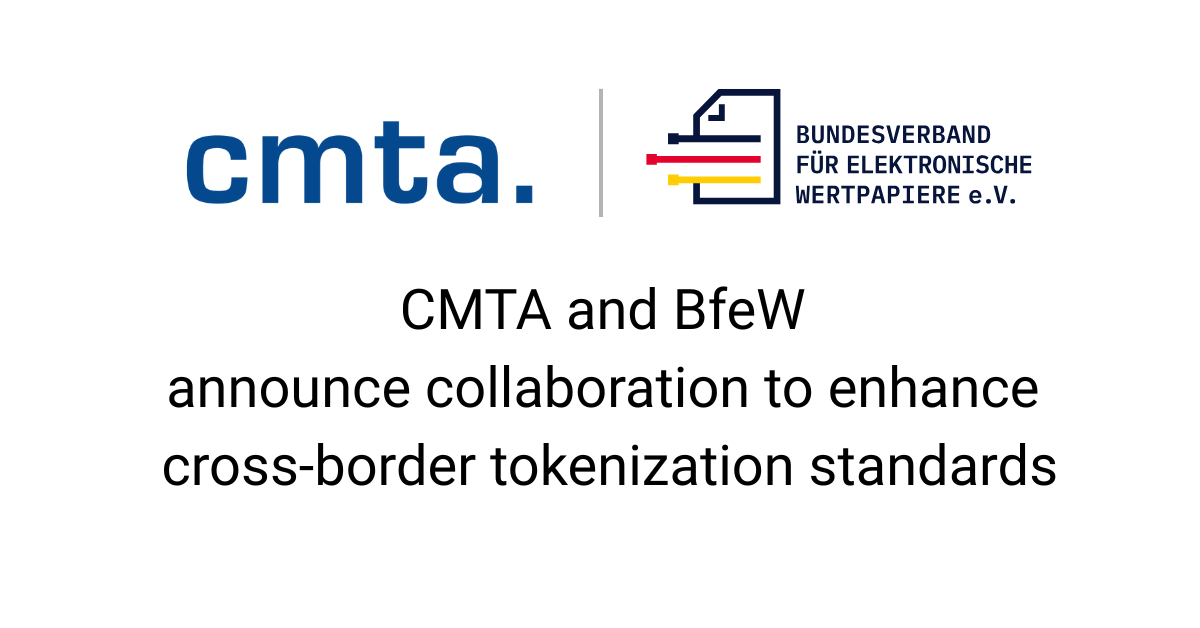CMTA and BfeW Announce Collaboration to Enhance Cross-Border Tokenization Standards
The Capital Markets and Technology Association (CMTA) and the German Association for Electronic Securities (Bundesverband für elektronische Wertpapiere e.V.) (BfeW) are pleased to announce their collaboration to advance the adoption of tokenization standards across jurisdictions. This partnership delivers a practical step in aligning technical frameworks for tokenization in Switzerland and Germany, progressing international standardization.
A key outcome of this collaboration is the update of CMTA’s smart contract framework for tokenization, the CMTAT, and the reference implementation to be consistent with the requirements of the German Electronic Securities Act (eWpG). The update has been reflected in the recently released version 3.0.0 of the Solidity reference implementation and enables the CMTAT to be used for tokenization processes within Germany’s regulatory environment.
In addition, the ERC-7551 standard, developed by BfeW, covers the core functions outlined in CMTA’s tokenization standards for Switzerland. This technical alignment highlights the adaptability of both frameworks and ensures that tokenization processes can be efficiently implemented across multiple jurisdictions.
Markus Kluge Joins CMTA’s Technical Advisory Board
To further enhance the collaboration, Markus Kluge has joined CMTA’s Technical Advisory Board Committee, which oversees the ongoing development and refinement of the CMTAT framework. His expertise will contribute to optimizing the framework’s compliance with the German regulatory framework.
A Modular Approach to Regulatory Compliance
Given that tokenization processes must comply with varying legal requirements across jurisdictions, the CMTAT’s modular design ensures flexibility. Its architecture allows token code to be modified by adding, removing, or adjusting features to align with local regulatory frameworks.
“CMTA is committed to collaborating with associations across the world and partners to tailor the CMTAT for use in different jurisdictions,” said Dr. Jacques Iffland, Chairman of CMTA. "International cooperation is essential to ensure the availability of smart contracts that can be used in a legally compliant manner across jurisdictions.”
Similarly, Christopher Görtz, Chairman of BfeW’s Board of Directors, emphasized, “This collaboration is a major step toward ensuring that tokenization frameworks remain compliant yet versatile, fostering innovation within the European digital securities market.”
About CMTA
The Capital Markets and Technology Association (CMTA) is a not-for-profit organization based in Geneva, Switzerland, dedicated to establishing standards for the integration of new technologies, particularly distributed ledger technology (DLT), in capital markets. Founded in 2018 by Lenz & Staehelin, Swissquote, and Temenos, with the support of Ecole Polytechnique Fédérale de Lausanne (EPFL), CMTA now counts over 40 members from the financial, technological, and legal sectors. CMTA publishes open standards for tokenizing financial instruments, digital asset custody, and compliance with anti-money laundering regulations. Its CMTAT
framework has become a recognized benchmark in the tokenization space, including acknowledgment in the Monetary Authority of Singapore’s Guardian Project.
About the CMTAT
The CMTAT is a modular smart contract framework designed for tokenizing securities on distributed ledgers such as blockchain. It is chain-agnostic and can be deployed on both public and permissioned networks, with reference implementations available on various blockchains including Ethereum and Tezos. The framework supports on-chain execution of corporate actions and integrates governance features such as whitelisting, blacklisting, and conditional transfers through an open-source rule engine.
About BfeW
The Bundesverband für elektronische Wertpapiere e.V. (BfeW) is dedicated to advancing the adoption of electronic securities in Germany. The association plays a critical role in developing standards, advocating for regulatory clarity, and fostering technological innovation to streamline the issuance and trading of tokenized securities.
For further details, please refer to:
